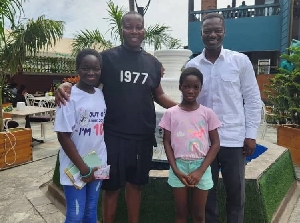General News of Monday, 15 June 2020
Source: GNA
Coronavirus: Voluntary blood donation down by 21 per cent
The National Blood Service, Ghana (NBSG) has recorded a 21 per cent decline in total blood collections and supply per last year’s record for January to May.
Dr Justina Ansah, the Chief Executive Officer of the National Blood Service, who attributed the situation to the COVID-19 crisis, explained that the total units of blood collected for the first five months of last year was 73,063. However, this declined to 57,268 for this year.
The CEO announced this at an event held on a virtual platform to commemorate the 2020 World Blood Donor Day, in Accra.
The Day is observed annually on June 14 to express appreciation to voluntary, unpaid blood donors for their life-saving gift of blood.
This year’s theme is: "Safe Blood Saves Lives", while the slogan is "Give blood and make the world a healthier place".
Voluntary blood donations constitute 28.7 per cent of the total units collected, with the 71.3 per cent coming from family replacement donations.
Dr Ansah said the situation was worrying as the implications for the sharp drop were for patients.
"This means that patients who cannot find relatives and friends to donate blood for them during emergencies such as bleeding from complications of childbirth, aggressive cancers, severe anaemia and severe bleeding from trauma may not recover," she stated.
She said since blood was not manufactured and also had a short span, its continuous supply must be assured through regular voluntary donations so that blood and its components became available whenever needed.
The CEO, therefore, appealed to eligible donors between the ages of 17 and 60 to visit the blood collection centres to donate blood to save and improve the quality of life of patients.
Dr Ansah explained that due to the pandemic, an appointment system had been introduced to ensure strict adherence to social distancing and other protocols at the collection sites.
She assured donors that adequate precautionary measures had been put in place, saying, "We are regularly monitoring the implementation of these measures to ensure strict compliance".
"We urge you to continue to donate blood on a regular basis and to also encourage your friends and relatives who are eligible to also donate blood."
She explained that there had not been any demonstrable transmission of COVID-19 through blood and its components; nonetheless, adequate measures had been put in place to contain any potential risk of infection through transfusion.
Mrs Tina Mensah, a Deputy Minister of Health, also commended voluntary blood donors for their continuous support in saving lives.
She said timely access to safe blood and blood products was important for all countries, as part of a comprehensive approach to prevent needless deaths.
“In this era of a new normal way of doing things, I strongly believe that community participation is key in ensuring a sufficient, safe and sustainable blood supply,” she said.
Mrs Mensah said: "Not long ago, the World Health Organization (WHO) targeted the year 2020 for all countries to obtain 100 per cent of their blood supplies from only voluntary unpaid donors however, Ghana has not achieved even 50 per cent of this target, despite the many efforts being made by the NBSG.
"My Ministry will continue to support the NBS to achieve this target. I wish to also pledge the Ministry's commitment to ensure self-sufficiency in safe blood and products based on 100 per cent voluntary unpaid donors".
The Minister gave the assurance that the process to secure the legal backing for the Agency’s status as NBS would be completed soon.
“We will take concrete steps in ensuring that the majority of Ghanaians develop the culture of voluntary blood donation and also provide support for blood donation campaigns at all levels," the Minister said.
Dr Neema Rusibamayila Kimambo, the WHO Country Representative, urged the Government to collaborate with blood donor associations and non-governmental organizations to increase investment in blood transfusion services in line with WHO guidelines.











